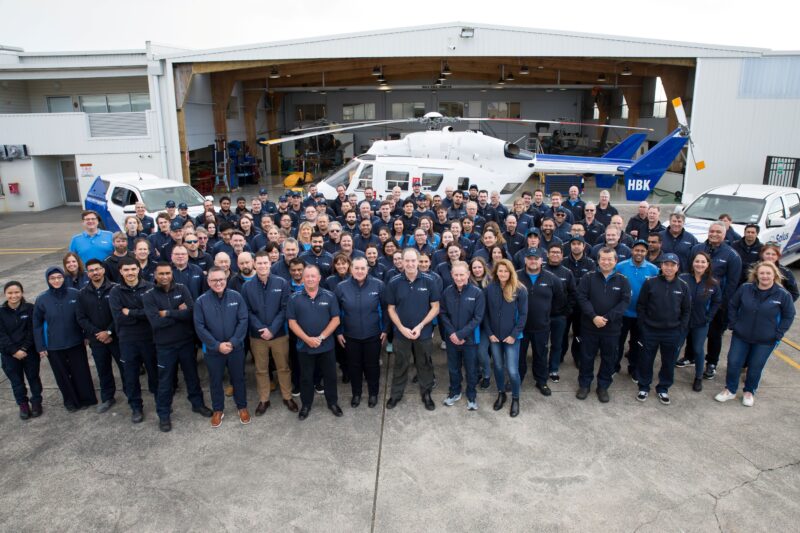Salus Aviation’s advice for successful expansion
From NZ Manufacturer September edition
 Salus Aviation’s story began in 1936 as a small aviation support provider based in rural Auckland, right next to Ardmore Airport.
Salus Aviation’s story began in 1936 as a small aviation support provider based in rural Auckland, right next to Ardmore Airport.
Over time, the company evolved through mergers and acquisitions to create a vertically integrated aviation company.
Today, it’s a true ‘nose-to-tail’ provider, leasing out aircraft, performing line maintenance, conducting heavy overhauls, manufacturing specialist equipment and supplying parts.
The EMA’s Nicholas Russell sat down with Salus Aviation CEO Greg Edmonds to discuss the company’s evolution, which has been driven by customer demand for comprehensive solutions and a desire to prove that a New Zealand company can compete with the biggest players internationally.
Q: What does Salus Aviation’s manufacturing workshop produce?
Greg Edmonds: We marry stringent aviation standards with world-class design and MRO capabilities to serve our clients globally Our experienced design and manufacturing teams create specialist role equipment and modifications for both fixed-wing and rotary aircraft.
Operating under NZCAA Part 148 manufacturing certification, we build and install advanced systems tailored to specific mission profiles – anything from agricultural operations to search and rescue.
We also manufacture crop-spraying systems, infrastructure inspection role equipment, and even full aircraft assemblies and modifications.
Our bespoke solutions extend aircraft capabilities and make operators safer and more efficient.
Q: What lessons can other manufacturers draw from Salus Aviation’s successful expansion?
Greg Edmonds: Vertical integration matters: We offer a ‘nose-to-tail’ service suite: design, MRO, parts supply, line maintenance, aircraft leasing and heavy overhaul. That gives us resilience and a competitive edge.
Certification and quality are non-negotiable: Our Part 148 certification ensures our products meet top-tier aviation standards.
Building a strong, proven foundation is key to successful growth: We sunk deep roots in New Zealand before looking outward, investing in markets like the Americas and Africa.
Niche specialisation sells: For example, we’re one of only two facilities globally that are capable of overhauling BK 117 transmissions, the other being Airbus in Germany. International customers choose us, including many based in Europe, which underlines our reputation for reliable service delivery.
How does Salus Aviation approach workforce education and development?
We have over 240 staff around the world, with about a 60/40 split between engineers and support staff. We’re in a highly regulated, safety-critical industry with strict SOP compliance and continual audits. We operate a multi-stage, role-specific induction that combines cultural alignment of our vision and values with regulatory safety training.
There’s a global shortage of aircraft engineers and New Zealand is not producing enough locally. This has forced us to recruit experienced overhaul engineers from overseas. However, current immigration settings, including limited Green List residency pathways, create costly risks.
We continue to pursue advocacy through the Aviation Industry Association and the EMA to secure specialist roles.
To try and build capacity locally, we run an apprenticeship programme, which currently has 11 apprentices. Another key challenge is raising awareness in schools, where students often don’t realise aircraft maintenance engineering is a career path.
Q: How does Salus Aviation and the EMA work together?
Greg Edmonds: Salus Aviation regularly attends the EMA’s Member Briefings, to stay up to date with economic and legal developments and to connect with other businesses.
Our HR team also uses the EMA AdviceLine, training and downloadable resources to manage employment risks and build capability. In addition, I’m on the EMA Export Advisory Board, where industry leaders meet every six weeks to discuss market changes and share intelligence.
The EMA also brings its Members to our facilities, so they can see and hear how Kiwi heavy engineering in aviation can truly compete globally.
Q: What’s next for Salus Aviation?
Greg Edmonds: Our domestic presence is strong, but our future growth lies overseas. We’re expanding in North and South America, where aircraft leasing and maintenance demand is growing.
We’ve just placed an executive general manager on the ground in Africa to capitalise on leasing and heavy overhaul opportunities. In Europe, recent upticks in demand have us considering a presence there in the next 2–3 years.



